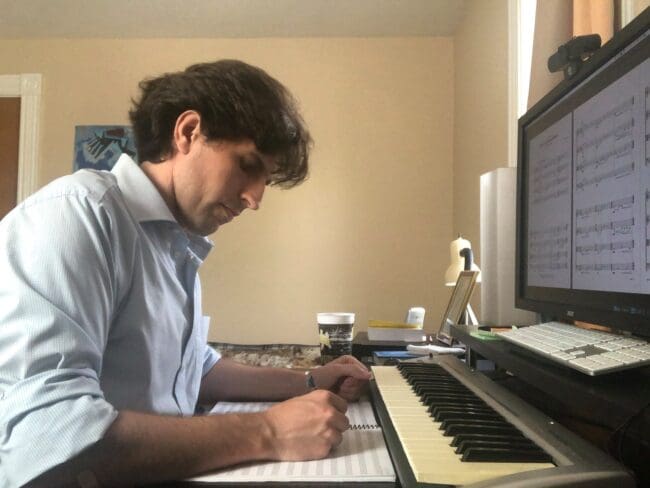All composers began as amateurs. You wrote music, with no or minimal training, because you loved it.
Sure, being an amateur had its frustrations. It often took you a forever of fumbling to find the figures you imagined.
But that earnest stumbling was part of the fun. In the end, simply hearing your music and thinking, “I made this!” was enough to offset the honest truth: “This doesn’t really sound like the music I idolize.”
Until it wasn’t.
The First Fluency: Technique
At some point, noticing that gap began to really grate on you — so you studied:
- You improved your ears — and became faster at capturing the sounds you imagined.
- You attuned your ears — and became adept at perceiving fine distinctions between sounds.
- You broadened your ears — and started noticing a wider range of musical sounds.
At first, these skills felt like water in a desert.
But as they began to take root in you, composing increasingly felt like climbing up a mountain of sand.
What gives? Here’s the secret:
If writing music were always like taking dictation, then composers would only need to develop well-trained ears.
Sometimes composing is just like that — but that’s often not the case.
Often, composers don’t actually know what pitches or rhythms they want. They may have a hunch, but no clear sonic picture. Or, they hear one dimension of the music well, but the other dimensions are all hazy.
In fact, if we’re being honest, composers regularly sit down with no ideas or feelings about what to write. On any given Tuesday morning, their aural imagination is a completely blank page.
And here you began to despair:
“What happened to the easiness?!” you ask — forgetting that you never were able to capture the sound of your musical idols.
“What happened to the joy! What happened to the fun!” you say — more reasonably, because composing did used to be those things.
The Second Fluency: Process
What happened was that you developed technical fluency without simultaneously developing process fluency.
Technical fluency means being able to capture what you hear using a DAW, notation, or both.
Process fluency means being able to develop your musical thoughts from initial inspiration to the completed piece.
Though these two fluencies rely on each other, they cannot take each other’s place:
- Technical fluency ensures you have a vocabulary — but not that you have something to say.
- Process fluency ensures you have something to say — but not the vocabulary with which to express it.
As an amateur, your processes were sufficient for your vocabulary. If you were like most composers, that process was some version of “fumble eagerly like a puppy through taking dictation from left to right.”
As you gained technical fluency on a professional level, you also needed to develop professional-level processes.
Professional composers do sometimes take left-to-right dictations from their aural imagination. But they also have reliable processes in place for when they know only some or even none of the details.
Despite rumors to the contrary, even Mozart didn’t just take dictation. (Beethoven sure as heck didn’t.)
So what does a professional-level compositional process look like? It has six key elements:
- Consulting tools that get you out of your head, help you internalize your collaborators’ needs and desires, and enrich your own ideas with other perspectives.
- Brainstorming tools that enable you to cultivate inspiration actively rather than waiting for it to “just happen.”
- Sketching tools that free you from the tyranny of perfectionism and “It has to come all at once.”
- Composing tools that show how to assemble your sketches in multiple ways besides “left to right.”
- Revising tools that give you constructive feedback rather than a general “This isn’t any good!”
- Shipping tools that make proofreading/parts-creation or mixing/mastering a breeze.
These details will be the subject of next week’s post.

Don’t Miss Next Week’s Post
Sign up to stay in the loop about my music—and ideas for your own composing!

